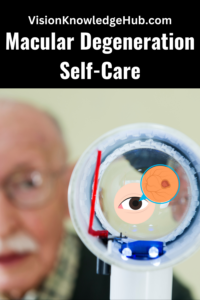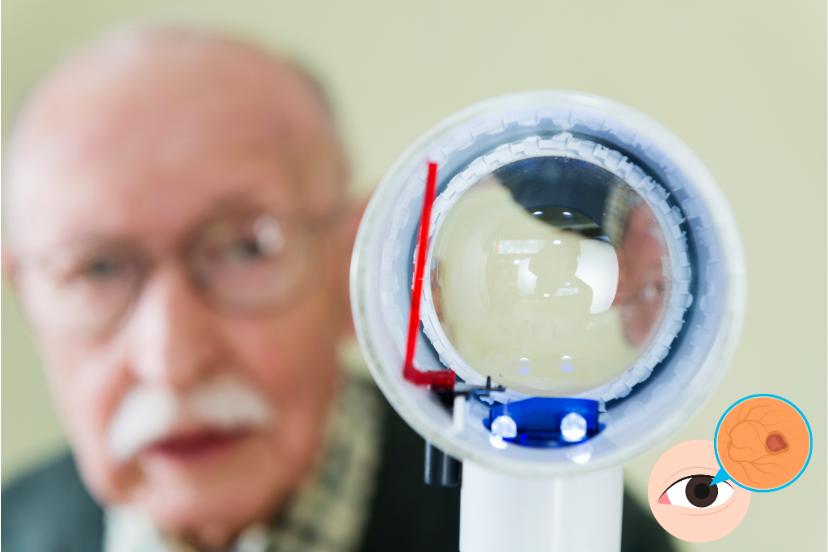Macular Degeneration Self-Care
Unlock the secrets of macular degeneration self-care. Dive into essential tips and practices to preserve vision and enhance eye health. Learn the pivotal role of lifestyle, diet, and regular check-ups in maintaining optimal eye health and preventing vision impairment. Dive in for expert advice and practical tips! In diving into macular degeneration self-care, we focus on proactive measures to maintain eye health and prevent vision impairment. Macular degeneration affects the central part of the retina, impacting our ability to see details. I believe in empowering individuals with knowledge and practices to combat this condition. Understanding the essence of eye health, incorporating a nutrient-rich diet, and adopting protective and preventive eye care routines can significantly curtail the onset and progression of macular degeneration.
Understanding Macular Degeneration
Macular degeneration requires a comprehensive insight into its impact on the retina, particularly the macula. Macular degeneration predominantly impairs central vision, compromising our ability to read, drive, and recognize faces. Two main types exist: Dry, more prevalent and generally milder, and Wet, rarer but more severe. As someone keenly involved in vision health, I cannot emphasize enough the significance of recognizing the symptoms early, which include blurred or distorted vision and difficulty adapting to low light. Early detection and a proactive approach to lifestyle and diet can significantly manage the condition and mitigate its progression.
Introduction to Macular Degeneration
Macular degeneration seriously threatens our vision by primarily affecting the macula within our retina, leading to substantial difficulties in performing everyday tasks like reading and recognizing faces. As someone passionate about vision health, I strongly advocate exploring various self-care strategies to understand this condition thoroughly and fortify eye health.
The Importance of Eye Health
Maintaining optimal eye health is pivotal for our overall well-being and quality of life. It enables us to engage effectively with the world around us, easily performing everyday activities. A lack of attention to eye health can result in severe conditions like macular degeneration, which can significantly impair vision. Regular eye check-ups, a healthy lifestyle, adequate protection against excessive light, and consuming a diet rich in essential nutrients are indispensable in preserving eye health. These proactive measures prevent the development of vision-related disorders and ensure the longevity of our visual health.
Types of Macular Degeneration
Macular degeneration manifests primarily in two distinct types: Dry and Wet. Dry macular degeneration, the more prevalent form, occurs due to thinning of the macula, usually attributed to aging, accompanied by the presence of drusen under the retina. Conversely, Wet macular degeneration is characterized by the growth of abnormal blood vessels beneath the retina, leading to leakage and scarring, which can significantly impair vision. Wet form, though less common, tends to progress faster and is more severe. Recognizing the type and understanding the unique characteristics of each is crucial, enabling tailored approaches for management and intervention focused on mitigating vision loss and enhancing the quality of life for those affected by these conditions. Early detection and appropriate lifestyle adjustments are paramount in managing both types effectively.
How to Treat Macular Degeneration Naturally
Role of Lifestyle in Macular Degeneration
Lifestyle plays a pivotal role in managing macular degeneration. By adopting a healthy lifestyle, which includes a balanced diet, regular exercise, and avoiding smoking and excessive alcohol, one can significantly lower the risk of developing this condition.
Influence of Diet and Nutrition
A nutrient-rich diet plays a pivotal role in maintaining robust eye health. Foods abundant in antioxidants, like colorful fruits and vegetables, are beneficial in shielding the eyes from oxidative stress, essential in preventing eye conditions and contributing significantly to overall visual wellness.
Foods Rich in Antioxidants
Regularly incorporating antioxidant-rich foods like berries, spinach, and oranges is vital. These foods fight against oxidative stress, a primary factor contributing to macular degeneration, and help in reinforcing eye health, providing a defensive barrier against numerous vision disorders.
Importance of Omega-3 Fatty Acids
The inclusion of Omega-3 fatty acids, found in fish and flaxseeds, is essential as they are crucial for the proper functioning and health of the retina. Regular intake of these fatty acids can substantially lower the risk of macular degeneration and other related vision issues, promoting long-lasting eye health.
Impact of Physical Activity
Regular physical activity is indispensable for maintaining overall well-being, including eye health. Exercise assists in managing health conditions such as high blood pressure and diabetes, which, if left unattended, can lead to severe vision problems.
Benefits of Regular Exercise
Maintaining a consistent exercise regimen can help lower the risks associated with vision loss by regulating optimal blood pressure levels and reducing the risks of diabetes, which can eventually lead to severe eye conditions if left unchecked.
Eye Exercises and Vision Health
Implementing eye exercises routinely can alleviate eye strain and enhance overall vision. They serve as proactive measures to strengthen eye muscles, improve focus, and diminish the risks associated with eye-related ailments.
Practical Self-Care Tips
Practical self-care tips such as wearing protective eyewear, managing stress effectively, maintaining regular sleep patterns, and having frequent eye check-ups, are crucial. Implementing these can aid significantly in preventing and managing macular degeneration and ensuring overall eye health.
Protective Eyewear
Wearing sunglasses that provide 100% protection against UVA and UVB rays is imperative. Sunglasses act as a protective barrier, shielding the eyes from the harmful effects of sunlight and thereby diminishing the risk of conditions like macular degeneration.
Regular Eye Check-ups
Opting for regular eye examinations is crucial for early detection and subsequent management of potential vision impairments, preventing severe vision loss, and facilitating timely intervention in conditions like macular degeneration.
Managing Stress and Sleep
Employing effective stress management techniques and ensuring adequate sleep is essential. Elevated stress levels and lack of sleep can have deleterious effects on vision health, making their proper management imperative for maintaining optimal eye health.
Smoking and Alcohol Consumption
Cutting down on smoking and moderating alcohol intake is crucial as both these factors are associated with an increased risk of macular degeneration. Therefore, moderation and cessation are pivotal for maintaining eye health.
Macular Degeneration Self-Care – Conclusion
Conclusively, adopting effective self-care practices is pivotal in managing macular degeneration. Embracing a healthy lifestyle, consuming a nutrient-rich diet, using protective eyewear, and opting for regular eye check-ups are crucial strategies. Early detection and immediate intervention are key to preventing substantial vision loss. Everyone should prioritize eye health, make informed choices, and take proactive steps to safeguard their vision against macular degeneration.
Empowering Self-Care for Vision Health
Adopting self-care practices is not just empowering but is also instrumental in maintaining visual acuity and preventing macular degeneration. Integrating a balanced diet, employing protective eyewear, engaging in regular exercise, and scheduling regular eye examinations are beneficial and practical steps toward nurturing long-lasting eye health.
Frequently Asked Questions (FAQs)
Can we reverse macular degeneration?
Macular degeneration cannot be reversed, but with early detection and appropriate intervention, it’s possible to manage its progression effectively, preserving the quality of vision and preventing further deterioration.
How frequently should we get our eyes checked?
Adults should have their eyes examined at least once every two years. However, more frequent check-ups might be necessary for those predisposed to eye conditions to monitor and manage their eye health effectively.
Is regular exercise genuinely beneficial for maintaining eye health?
Indeed, incorporating regular physical activity is foundational for eye health. It assists in maintaining overall well-being and mitigates the risks of conditions that can adversely impact vision, rendering it an essential component of holistic eye care.
Is there a hereditary component to macular degeneration?
Indeed, there is a hereditary component to macular degeneration. If your parents or siblings have this condition, your risk increases. However, lifestyle and environmental factors also play significant roles. Therefore, maintaining a healthy lifestyle and mitigating exposure to harmful environmental factors are imperative to reduce risks, even if there’s a family history of the condition.
What exercise is best for macular degeneration?
Low-impact exercises like walking, swimming, and cycling are usually best for those with macular degeneration, as they are less likely to strain the eyes. Regular, moderate exercise can help maintain healthy blood pressure levels and efficient blood circulation, both crucial in preventing vision loss and managing the progression of macular degeneration effectively. Prioritize consistency in exercise.
What foods help heal macular degeneration?
Foods rich in antioxidants, vitamins C and E, zinc, and copper can aid in managing macular degeneration. Emphasize green, leafy vegetables, colorful fruits, fish high in omega-3 fatty acids, and nuts. These foods combat oxidative stress, reduce inflammation, and can help in maintaining overall eye health and vision sharpness.
Extra FAQs Related to Macular Degeneration Self-Care
What should I avoid if I have macular degeneration?
If you have macular degeneration, avoid direct exposure to sunlight, and always wear sunglasses with complete UV protection. Avoid smoking and excessive alcohol consumption, as they can accelerate degeneration. Stay away from processed foods and those high in fats and sugars. Instead, prioritize a diet rich in fruits, vegetables, and fish, which can protect eye health.
Can a balanced diet alone prevent macular degeneration?
While maintaining a balanced diet is crucial, complementing it with other lifestyle modifications such as wearing protective eyewear, undergoing regular eye examinations, and engaging in physical activity is essential for comprehensive eye health and the prevention of diseases.
What makes macular degeneration worse?
Certain factors can exacerbate macular degeneration. Smoking is a leading contributor, significantly worsening the condition. Poor diet, laden with saturated fats and lacking in antioxidants and vitamins, can accelerate degeneration. Overexposure to sunlight and uncontrolled high blood pressure are other detrimental factors. Avoiding these risk factors can aid in managing the condition effectively.
What are macular degeneration symptoms?
Symptoms of macular degeneration include blurred or reduced central vision, a need for brighter light when reading, increased difficulty adapting to low light levels, and seeing straight lines as distorted or wavy. In some cases, there might also be a clear loss of intensive brightness in colors. Early detection is crucial to manage the symptoms effectively.
What is the best treatment for macular degeneration?
The optimal treatment for macular degeneration depends on its type. For Wet macular degeneration, anti-VEGF injections help in reducing abnormal blood vessel growth. In Dry macular degeneration, a balanced diet rich in antioxidants and zinc can be beneficial. Early detection and regular monitoring are crucial to effectively manage the condition and prevent further vision loss.





